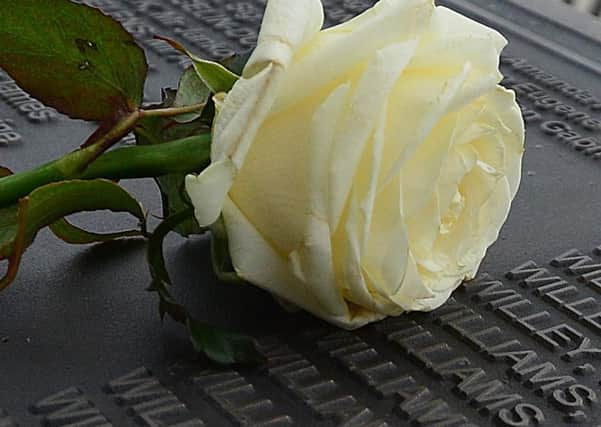Each Troubles death should be marked by a memorial


It may prove impossible to reach an accommodation that satisfies all parties.
However, the current –unspoken- strategy of some in government would appear to be to allow the victims to recede into the past, as memories fade for all but the closest relatives. This would be profoundly wrong, and would do future generations almost as great a disservice as the bereaved, allowing society to minimise the tragedies of the recent past, and assuming that similar event could never recur. History has taught us the folly of that approach.
Advertisement
Hide AdAdvertisement
Hide AdAs a very limited step towards addressing the need to remember, I would therefore suggest an official permanent and public memorial for each person who has lost his or her life . This could take the form of a standard circular black metal plaque, with only the name, age, and date of death of the deceased, similar in size to the blue plaques currently used by the Ulster History Circle, and erected as closely as possible to the site of the actual death, whether on a wall of a building, pavement, or other fixed point.


I hope that such a universal and non-judgmental display could have a considerable and beneficial impact on the currently becalmed issue of “the past”. Inevitably there will be many areas where there could be an abundance of such memorials, either because of multiple casualties in one incident, or because of the number of fatalities in that location over a prolonged period of time.
Of itself, that would not be a bad thing: it is important for those non-residents in an area to see the disproportionate burden carried by those who are. I think that it would be a striking warning to those who have grown up in a province now largely peaceful, that life was very different not so long ago. In discussions with those who have been bereaved, I have often heard that their relations have been forgotten, but the permanent presence of a memorial plaque gives a recognition of their loss both public and official.
If properly understood as merely the record of an event, a memorial plaque could not become a shrine or a focal point for the endorsement of the actions or political views of the person so commemorated. In practice there are already many areas where there are such unofficial memorials that can cause offence to those who take issue with the presentation of the deceased as victims or heroes. A plaque would be as uncontroversial as a roadside shrine to one killed in a car accident, but equally capable of provoking reflection for those unfamiliar with the event that had occurred there. It might also help to reduce the recent spate of illegal pseudo-war memorials in areas of public space. For many families this might be the first official recognition of their loss.
Advertisement
Hide AdAdvertisement
Hide AdOne can imagine that there might be resistance in some quarters. Perhaps the owner of a property might object to a very public record of an event that took place there forty years ago. This is why the scheme would probably have to have a statutory footing, with all of the deceased (as defined in “Lost Lives” or some other generally accepted record) being commemorated.


It must be seen as the duty of the homeowner and society as a whole to record the fact of every death. I also recognise that it might be uncomfortable for some communities to have a visible record of those who have died in their streets, perhaps at the hands of some of their own neighbours. That is why is so important that all deaths are recognised equally, and the fraught issue of victim hierarchy be dealt with elsewhere.
There would of course also be some cost implications, of course. But, to take one example, if it causes the Christmas shoppers on the Railway Road in Coleraine to pause and reflect as they pass the site of the 1973 bomb, on the six families that were bereaved, and to decide that they will not allow things to happen again, is that not a worthwhile investment? Is it too optimistic to think that a plaque may even provoke young people, who regard what my generation experienced as history, to enquire as to what purpose was served by the loss of a life?
Perhaps the political parties might care to comment?
David Brewster, Limavady